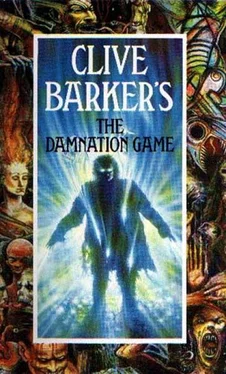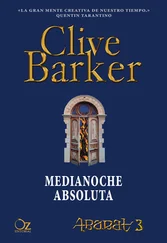Clive Barker - The Damnation Game
Здесь есть возможность читать онлайн «Clive Barker - The Damnation Game» весь текст электронной книги совершенно бесплатно (целиком полную версию без сокращений). В некоторых случаях можно слушать аудио, скачать через торрент в формате fb2 и присутствует краткое содержание. Жанр: Ужасы и Мистика, на английском языке. Описание произведения, (предисловие) а так же отзывы посетителей доступны на портале библиотеки ЛибКат.
- Название:The Damnation Game
- Автор:
- Жанр:
- Год:неизвестен
- ISBN:нет данных
- Рейтинг книги:4 / 5. Голосов: 2
-
Избранное:Добавить в избранное
- Отзывы:
-
Ваша оценка:
- 80
- 1
- 2
- 3
- 4
- 5
The Damnation Game: краткое содержание, описание и аннотация
Предлагаем к чтению аннотацию, описание, краткое содержание или предисловие (зависит от того, что написал сам автор книги «The Damnation Game»). Если вы не нашли необходимую информацию о книге — напишите в комментариях, мы постараемся отыскать её.
The Damnation Game — читать онлайн бесплатно полную книгу (весь текст) целиком
Ниже представлен текст книги, разбитый по страницам. Система сохранения места последней прочитанной страницы, позволяет с удобством читать онлайн бесплатно книгу «The Damnation Game», без необходимости каждый раз заново искать на чём Вы остановились. Поставьте закладку, и сможете в любой момент перейти на страницу, на которой закончили чтение.
Интервал:
Закладка:
And yet...
Why did he feel as if the games they'd played all these years-the Temptation games, the Revelation games, the Rejection, Vilification and Damnation games-were not quite over? His intuition, like his strength, was dwindling: but he was certain that something was amiss. He thought of the way the woman at his side smiled; the secret on her face.
"Is he dead?" he suddenly asked her.
The question appeared to flummox her. "Of course he's dead," she replied.
"Is he, Carys?"
"We just saw his funeral, for God's sake."
She felt his mind, a solid presence, at the back of her neck. They had played this scene many times in the preceding weeks-the trial of strength between wills-and she knew that he was weaker by the day. Not so weak as to be negligible, however: he could still deliver terrors, if it suited him.
"Tell me your thoughts . ." he said, so I don't have to dig for them."
If she didn't answer his questions, and he entered her forcibly, he'd see the runner for certain.
"Please," she said, making a sham of cowardice, "don't hurt me."
The mind withdrew a little.
"Is he dead?" Mamoulian inquired again.
"The night he died..." she began. What could she tell but the truth' No lie would suffice: he would know. "... The night they said he died felt nothing. There was no change. Not like when Mama died."
She threw a cowed look at Mamoulian, to reinforce the illusion of servility.
"What do you construe from that?" he asked.
"I don't know," she replied quite honestly.
"What do you guess?"
Again, honestly: "That he isn't dead."
The first smile Carys had ever seen on the European's face appeared. It was merest hint, but it was there. She felt him withdraw the horns of his thought and content himself with musing. He would not press her further. Too many plans to plan.
"Oh, Pilgrim," he said under his breath, chiding his invisible enemy like a much-loved but errant child, "you almost had me fooled."
Marty followed the car off the highway and across the city to the house on Caliban Street. It was early evening by the time the pursuit ended. Parked at a prudent distance he watched them get out of the car. The European paid the driver and then, after some delay unlocking the front door, he and Carys stepped into a house whose dirtied lace curtains and peeling paintwork suggested nothing abnormal in a street whose houses were all in need of renovation. Alight went on at the middle floor: a blind was drawn.
He sat in the car for an hour, keeping the house in view, though nothing happened. She did not appear at the window; no letters were thrown, wrapped in stones and kisses, out to her waiting hero. But he hadn't really expected such signs; they were fictional devices, and this was real. Dirty stone, dirty windows, dirty terrors skulking at his groin.
He hadn't eaten properly since the announcement of Whitehead's death; now for the first time since that morning, he felt healthily hungry. Leaving the house to creeping twilight, he went to find himself sustenance.
Luther was packing. The days since Whitehead's death had been a whirlwind, and he was dizzied by it. With so much money in his pocket, every minute a new option occurred to him, a fantasy now realizable. For the short term at least he'd decided to go home to Jamaica for a long holiday. He had left when he was eight, nineteen years ago; his memories of the island were gilded. He was prepared to be disappointed, but if he didn't like the place, no matter. A man of his newfound wealth needed no specific plans: he could move on. Another island; another continent.
He had almost finished his preparations for departure when a voice called him from downstairs. It wasn't a voice he knew.
"Luther? Are you there?"
He went to the top of the stairs. The woman he'd once shared this small house with had gone, left him six months ago taking their children. The house should have been empty. But there was somebody in the hall; not one but two people. His interlocutor, a tall, even stately man, stared up the stairs at him, light from the landing shining on his wide, smooth brow. Luther recognized the face; from the funeral perhaps? Behind him, in shadow, was a heavier figure.
"I'd like a word," said the first.
"How did you get in here? Who the hell are you?"
"Just a word. About your employer."
"Are you from the press, is that it? Look, I've told you everything I know. Now get the hell out of here before I call the police. You've got no right breaking in here."
The second man stepped out of the shadows and looked up the stairs. His face was made-up, that much was apparent even from a distance. The flesh was powdered, the cheeks rouged: he looked like a pantomime dame. Luther stepped back from the top of the stairs, mind racing. "Don't be afraid," the first man said, and the way he said it made Luther more afraid than ever. What capacities might such politeness harbor?
"If you're not out of here in ten seconds-" he warned.
"Where is Joseph?" the polite man asked.
"Dead."
"Are you sure?"
"Of course I'm sure. I saw you at the funeral, didn't I? I don't know who you are-"
"My name is Mamoulian."
"Well, you were there, weren't you? You saw for yourself. He's dead."
"I saw a box."
"He's dead, man," Luther insisted.
"You were the one who found him, I gather," the European said, moving a few silent paces across the hallway to the bottom of the stairs.
"That's right. In bed," Luther replied. Maybe they were press, after all. "I found him in bed. He died in his sleep."
"Come down here. Furnish the details, if you would."
"I'm fine where I am."
The European looked up at the chauffeur's frowning face; felt, tentatively, at the nape of his neck. There was too much heat and dirt in there; he wasn't resilient enough for an investigation. There were other, cruder methods, however. He half-gestured toward the Razor-Eater, whose sandalwood presence he smelled close.
"This is Anthony Breer," he said. "He has in his time dispatched children and dogs-you remember the dogs, Luther?-with admirable thoroughness. He is not afraid of death. Indeed he enjoys an extraordinary empathy with it."
The pantomime face gleamed up from the stairwell, desire in its eyes.
"Now, please," Mamoulian said, "for both our sakes; the truth."
Luther's throat was so dry the words scarcely came. "The old man's dead," he said. "That's all I know. If I knew any more I'd tell you."
Mamoulian nodded; the look on his face as he spoke was compassionate, as if he genuinely feared for what must happen next.
"You tell me something I want to believe; and you say it with such conviction I almost do. In principle I can leave, content, and you can go about your business. Except"-he sighed, heavily-"except that I don't quite believe you enough."
"Look, this is my fucking house!" Luther blustered, sensing that extreme measures were needed now. The man called Breer had unbuttoned his jacket. He wore no shirt underneath. There were skewers threaded through the fat of his chest, transfixing his nipples, crossways. He reached up and drew two out; no blood came. Armed with these steel needles, he shuffled to the bottom of the stairs.
"I've done nothing," Luther pleaded.
"So you say."
The Razor-Eater began to mount the stairs. The unpowdered breasts were hairless and yellowish.
"Wait!"
At Luther's shout, Breer paused.
"Yes?" said Mamoulian.
"You keep him off me!"
"If you have something to tell me, spit it out. I'm more than eager to listen."
Luther nodded. Breer's face registered disappointment. Luther swallowed hard before speaking. He'd been paid what was to him a small fortune not to say what he was about to say, but Whitehead hadn't warned him that it would be like this. He'd expected a gaggle of inquisitive reporters, perhaps even a lucrative offer for his story to go into the Sunday papers, but not this: not this ogre, with his doll's face and his bloodless wounds. There was a limit to the amount of silence any money could buy, for Christ's sake.
Читать дальшеИнтервал:
Закладка:
Похожие книги на «The Damnation Game»
Представляем Вашему вниманию похожие книги на «The Damnation Game» списком для выбора. Мы отобрали схожую по названию и смыслу литературу в надежде предоставить читателям больше вариантов отыскать новые, интересные, ещё непрочитанные произведения.
Обсуждение, отзывы о книге «The Damnation Game» и просто собственные мнения читателей. Оставьте ваши комментарии, напишите, что Вы думаете о произведении, его смысле или главных героях. Укажите что конкретно понравилось, а что нет, и почему Вы так считаете.








